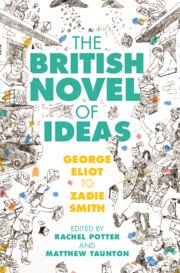Book contents
- The British Novel of Ideas
- The British Novel of Ideas
- Copyright page
- Contents
- Contributors
- Dedication
- Introduction The British Novel of Ideas
- Part I 1850–1900
- Part II 1900–1945
- Part III 1945–1975
- Part IV 1975–Present
- Chapter 20 Comedy, Sincerity, and Hypocrisy in the Novel of Ideas
- Chapter 21 Malcolm Bradbury
- Chapter 22 Hanif Kureishi
- Chapter 23 Ian McEwan
- Chapter 24 Kamila Shamsie
- Chapter 25 Zadie Smith
- Bibliography
- Index
Chapter 25 - Zadie Smith
Art and Beauty
from Part IV - 1975–Present
Published online by Cambridge University Press: 05 December 2024
- The British Novel of Ideas
- The British Novel of Ideas
- Copyright page
- Contents
- Contributors
- Dedication
- Introduction The British Novel of Ideas
- Part I 1850–1900
- Part II 1900–1945
- Part III 1945–1975
- Part IV 1975–Present
- Chapter 20 Comedy, Sincerity, and Hypocrisy in the Novel of Ideas
- Chapter 21 Malcolm Bradbury
- Chapter 22 Hanif Kureishi
- Chapter 23 Ian McEwan
- Chapter 24 Kamila Shamsie
- Chapter 25 Zadie Smith
- Bibliography
- Index
Summary
Beauty does not rest in the forms we encounter it, or match with the idea we have of it. Ludwig Wittgenstein writes that ‘when the eye sees something beautiful, the hand wants to draw it’. Beauty happens in this difficult gulf between hand and eye, between eye and ear. This essay asks how the novel of ideas might approach the problem of beauty, by attending to the dialogue between Zadie Smith and E. M. Forster, as it is conducted in Smith’s 2006 novel On Beauty. In staging her novel as a reprise of Forster’s Howards End, Smith suggests that the artwork is bound up with the question of duplication, as beauty, in Elaine Scarry’s terms, ‘brings copies of itself into being’ (Elaine Scarry). Beauty eludes the critical gaze; but in the ground that lies between On Beauty and Howards End, this essay looks for a kind of critical language and a kind of political institution in which the idea of beauty might find expression.
- Type
- Chapter
- Information
- The British Novel of IdeasGeorge Eliot to Zadie Smith, pp. 429 - 445Publisher: Cambridge University PressPrint publication year: 2024

